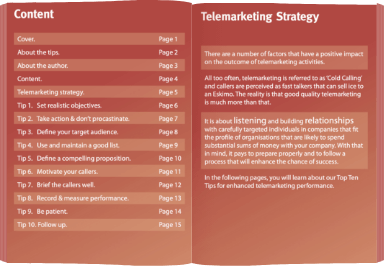Whether you have one or 100 telemarketers working within your business, managing a b2b telemarketing team effectively is a critical determinant of success. Leaving them to their own devices will not work. Starving them of support will guarantee failure.
In today’s competitive business landscape, having a well-organised and motivated team can significantly impact the success of your telemarketing campaigns. This article explores key strategies and best practices to get the most from your B2B telemarketing team.
Effective Telemarketing Team Management
According to a study by InsideSales.com, effective team management can boost telemarketing productivity by 30%. What’s more, research conducted by Gallup revealed that engaged teams outperform their peers by 21% in profitability.
With that in mind, why would organisations allow these key sales staff to fend for themselves? They represent the business and are the face, or at least the voice of, the brand. But it’s fair to say that some companies, and some managers, don;t actually understand what support is required. They don’t know what ‘good’ looks like.
Below, are just a few of the main areas of support required to manage a B2B Telemarketing Team.
Provide Systems that Make Life Easy
Leveraging CRM systems for efficient lead management is a fundamental determinant of success. Slow, cumbersome systems, impede call rates, and frustrate telemarketers. The fewer clicks needed the better. Automating repetitive tasks for increased productivity is sensible. Remove as much manual activity as possible so that they can concentrate on what they’re good at, i.e. calling customers.
Remove Unnecessary Tasks
Do your callers spend way too much time on Google, searching for information? Do they need to check your accounts system for past orders? Is a credit check necessary for their role? The more that your telemarketing team can focus on calling, the more leads you’ll see through the door. And, that will happen more swiftly. What’s more, telemarketers that genuinely enjoy the interaction with your customers will quickly become disheartened if they’re prevented from making calls.
Build a Strong Foundation:
Maybe it’s obvious, but don’t put people on the phone that don’t want to be there. It might sound obvious, but having done hundreds of training courses in my time, I’m in a position to state that many callers don’t actually like doing it. And, many others have poor techniques and skills. So, make sure you start with recruitment. Check out this article on whether telemarketers are born or made.
Don’t Neglect Training
Training is always important. But, that doesn’t always mean training on specific techniques and scenarios. Good telemarketers should be adept at handling objections, dealing with gatekeeper blocks and handling rejection. However, everyone hits roadblocks. That’s where effective management comes in to discuss fresh approaches, look at alternate scenarios, consider different target audiences and so on. So, make sure you engage regularly with your callers to avoid them flogging a dead horse.
Provide Clear Goals
Research by Forbes indicates that setting clear goals and metrics increases employee performance by 30%. Targets are essential. Unrealistic goals are demoralising though. Hence, it’s important that the targets you set are based on some kind of benchmark, or at least with an understanding of the market and the size and difficulty of the task. Every company wants to grow. But, putting undue pressure on those that are the face of your organisation may be damaging.
Measure and Communicate KPIs
An Aberdeen Group study revealed that companies using analytics in their sales processes experience a 15% higher win rate.
Tracking KPIs on a daily, weekly and monthly basis is paramount. Don’t wait until it’s too late to make a change. Compare telemarketers too if that’s possible. Understanding what’s viable is enhanced by comparing performance. Even if you don’t have a call centre with digital performance monitors showing success on a minute by minute basis, you can still provide daily stats on your campaign results.
Establishing Clear Communication Channels
Regular team meetings and updates make the life of a telemarketer much more bearable. It’s a tough job. Why make it more difficult by providing limited input? A study by McKinsey found that effective communication improves productivity by 25% on average. So, try to provide ongoing feedback to enhance skills and performance
Ensure the Campaign Briefing is Comprehensive
Garbage in, garbage out is a well-known expression. The same goes for briefing. If your callers don’t thoroughly understand the brief, their success will be compromised. That means understanding the target sector, the challenges experienced by the companies, and more specifically the decision-makers they are going to call. It means being updated on the data parameters and whether they’re going to follow-up email opens and clicks, LinkedIn connections, or go after cold targets. Are they calling existing or lapsed customers, or fresh prospects? A full understanding of what’s in front of the caller will enhance their ability to generate leads.
Give Them the Tools to Hit the Target
Poor contact data will cause every campaign to fail. You can’t hit a target that you can’t see. You also won’t hit the target with a bow without arrows. If either your targeting or your proposition is out of kilter, your results will suffer. So, it’s the responsibility of management to equip their callers with a good set of accurate contact data, and a compelling call to action that enables them to generate the appropriate number of leads.
Additional Factors
It goes without saying that the above are not the only elements for telemarketing success factors. You need to pay your callers appropriately, and give them some incentive to achieve success. A positive office working environment is also important, albeit, these days, working from home is becoming more relevant. In some companies, the opportunity for progression may be a motivating factor. In others, it may be flexibility such as working part-time.
Conclusion
By understanding the significance of each of the above components, you’ll be better placed to support your telemarketers to generate success for your business.
It starts with recruiting and training the right talent. You need to establish clear communication channels, set achievable goals, and provide ongoing coaching and feedback. A positive work environment is essential, whether that’s office or remote-based. And, technology will certainly facilitate better output and allow you to measure it.






